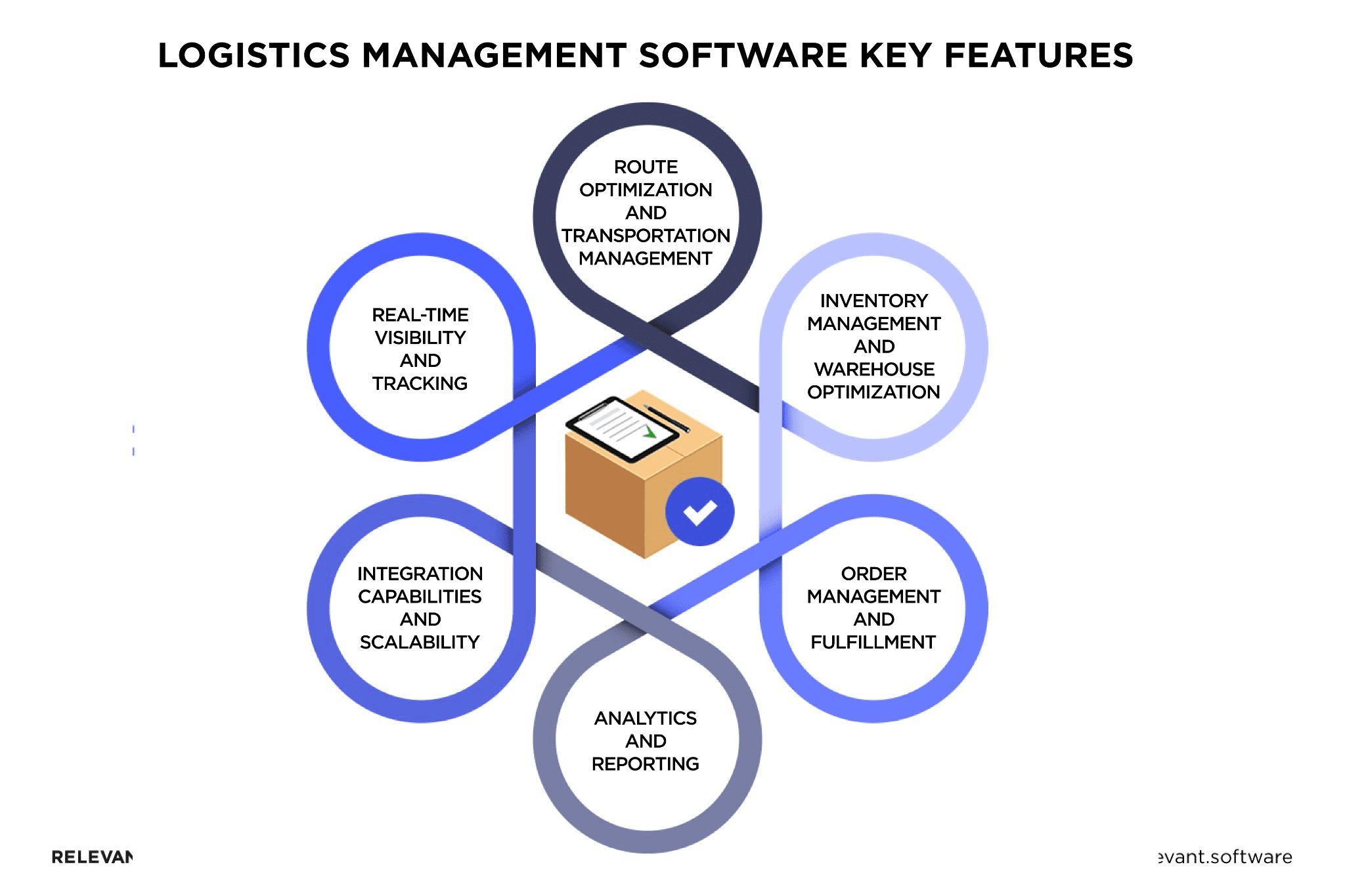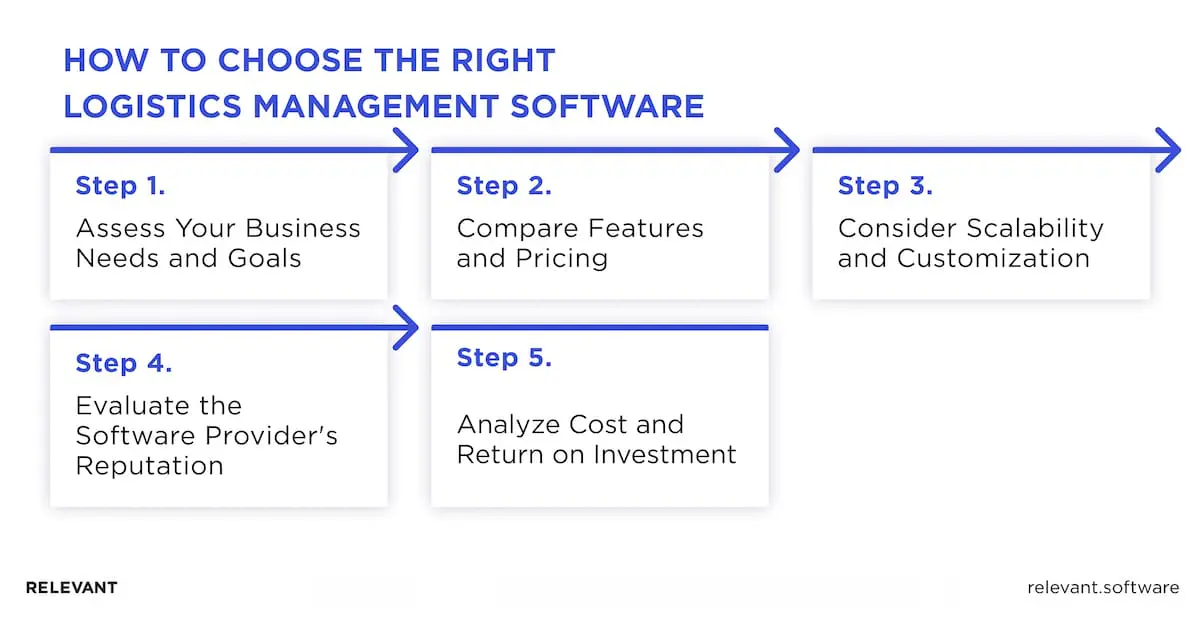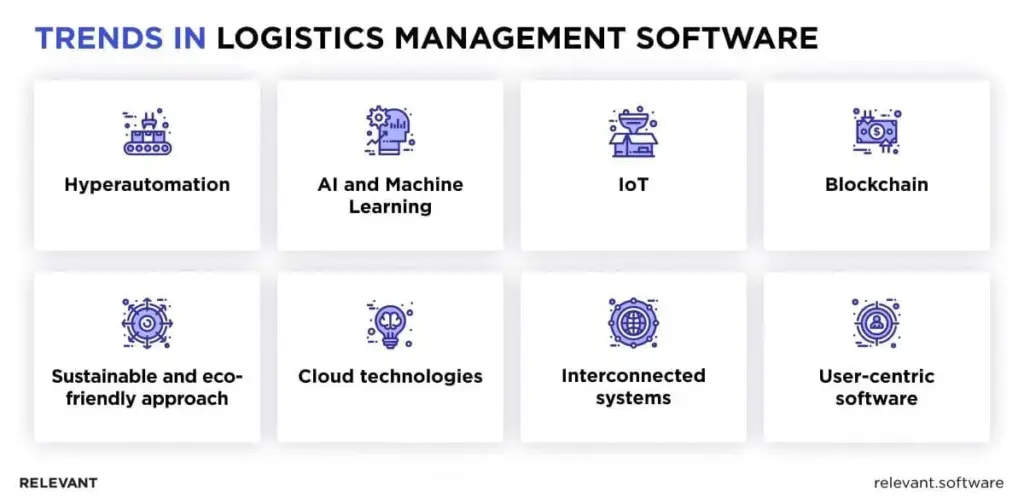Unlocking the Potential of Logistics Management Software: A Comprehensive Guide

Think of this: your business is primed to break into a lucrative new market. The opportunity aligns perfectly with your product’s potential—but can your existing logistics management software or supply chain management system keep pace? For many organizations, the answer is no. Relevant Software’s team of seasoned product developers and industry analysts, who have extensively studied the market, report that more than 50% of companies struggle with insufficient visibility across their supply chains. This leaves them vulnerable to inefficiencies and disruptions. In a world where customer expectations revolve around speed, reliability, and precision, outdated supply chains are no longer viable.
This is where modern logistics solutions become a strategic enabler, transforming opaque, reactive systems into transparent and agile networks. They do more than address operational bottlenecks. The right supply chain management logistics software provides the clarity, control, and adaptability required to navigate complexity and seize emerging opportunities.
from 25 countries outsourced software development to Relevant
We provide companies with senior tech talent and product development expertise to build world-class software.
Let’s take a step back and start by defining the basics.
What is logistics management software?
At the core of every successful supply chain is logistics management, the process that moves goods efficiently from point A to point B—and often back again. But it doesn’t end there—logistics also handles the complications: returns, damaged goods, and shipment errors that can disrupt operations if not addressed effectively.
Logistics management software (LMS) acts as the engine behind this process. By offering real-time visibility and actionable insights, LMS enables businesses to refine storage practices, optimize transportation networks, and orchestrate logistics execution with unparalleled precision. Integrated with existing supply chain systems, LMS enables clear decisions on inventory, delivery schedules, and cost control.
The benefits of logistics management software are undeniable, but finding the right solution is often complex due to the vast range of options available. Without a clear understanding of your specific needs, it’s easy to choose a system that lacks essential features or includes unnecessary functions that add complexity.
Key features of logistics management software
In today’s intensely competitive market, where consumer expectations continue to rise, utilizing advanced logistics management software has become crucial for businesses striving to maintain an edge in the age of digital transformation. Relevant Software experts have shared the key logistics management software features that can elevate your supply chain operations and bring clarity to complex challenges.

Real-time visibility and tracking
Achieving comprehensive, real-time visibility across the supply chain remains essential. Customers now expect to track their orders and receive immediate updates on delivery statuses. Notably, 31% of enterprises state that offering such transparency is critical for meeting customer commitments. According to the experience of Relevant Software’s clients, full visibility allows teams to address challenges effectively and ensure processes continue without disruption.
Route optimization and transportation management
The core objective of logistics is efficient goods movement. LMS equipped with transportation management tools offers essential capabilities:
- Carrier Integration: Connect with third-party logistics providers to automate shipments and compare rates and delivery times in real-time.
- Load Planning: Maximize shipment efficiency by adjusting truck loads based on weight, volume, and destination.
- Route Optimization: Identify the most cost-effective transportation paths to ensure on-time deliveries while minimizing expenses.
- Fleet Management: Track driver performance, fuel consumption, and vehicle maintenance to lower costs and enhance service reliability.
- Centralized Communication: Gather shipment-related data in one place to enable smooth coordination between teams and partners.
Inventory management and warehouse optimization
Effective inventory management and warehouse optimization are pivotal to a seamless supply chain. Logistics management software equipped with a robust inventory asset management system enables businesses to maintain optimal stock levels and streamline warehouse operations. These systems offer real-time visibility across multiple facilities, ensuring efficient storage, tracking, and movement of goods.
Key functionalities of an integrated inventory and warehouse management solution include:
- Receiving: Confirms the quantity and quality of incoming goods before adding them to the inventory system to ensure accuracy.
- Putaway: Places items in designated storage locations with RFID or barcode technology. AI-driven logistics software suggests the most efficient locations based on product attributes.
- Multilocation Inventory Tracking: Uses IoT systems to offer a clear view of inventory across warehouses, which enables faster retrieval, higher accuracy, and better handling of products nearing expiration.
- Pick Operations: Directs staff to exact item locations, consolidates orders for efficiency, and verifies accuracy with barcode or RFID checks.
- Pack Operations: Recommends suitable methods and materials to protect goods during transit, which reduces damage and improves efficiency.
- Returns Process: Assesses returned goods, processes refunds, and determines whether items should be restocked or disposed of.
- Real-Time Reports: Delivers up-to-date data on inventory levels and fulfillment rates, supporting precise decisions and stronger control over warehouse activities.
Some businesses prefer standalone warehouse management software, while others integrate inventory and warehouse management capabilities into comprehensive logistics management software solutions. Both approaches deliver the insights and efficiency needed to streamline operations, reduce expenses, and tackle the complexities of modern supply chains.
Your next read: barcode inventory management.
Order management and fulfillment
In today’s demanding market, order management and fulfillment are pivotal to ensuring customer satisfaction and solidifying your brand’s position. An Order Management System (OMS) links every stage—order entry, inventory control, fulfillment, and post-sale service—into a cohesive and efficient process.
An advanced OMS goes beyond handling processes—it offers a unified dashboard for real-time visibility into your entire supply chain. Customers benefit from precise order tracking, while businesses gain actionable insights to optimize stock levels, reduce errors, and automate repetitive workflows. This dual visibility fosters trust, streamlines operations, and drives measurable results.
Incorporating an OMS into your logistics strategy positions your business to stay ahead of the competition, lower costs, and consistently deliver on rising customer expectations.
Analytics and reporting
In supply chain management, analytics and reporting aren’t just helpful—they’re transformative. They provide the insights businesses need to optimize operations, forecast challenges, and make smarter decisions. Tools powered by AI and machine learning take this further by automating tasks and adjusting to new demands without constant oversight.
A study by Accenture reveals that companies with advanced supply chain capabilities see 23% higher profitability, yet few consumer goods businesses have reached this level. The leaders rely on intelligent systems for predictive analytics, resource planning, and sustainability, setting them apart from competitors still dependent on outdated processes.
Integration capabilities and scalability
Effective logistics management software connects with systems like enterprise resource planning and procurement software to create cohesive supply chain operations. This connection ensures processes—from sourcing raw materials to delivering finished goods—remain smooth and reliable.
A great software for logistics management grows with your business. As requirements expand, it adjusts to maintain consistent service delivery performance. Paired with advanced automation, it turns logistics workflows into agile, adaptable systems capable of meeting changing market demands with confidence.
Benefits of implementing logistics management software
Integrating logistics software into your business represents a fundamental shift in how supply chain operations are managed. By addressing inefficiencies at every level—inventory, warehousing, and transportation planning—it empowers organizations to deliver better results with fewer resources. Let’s dive into the reasons why logistics management software development is a smart investment for modern businesses.
| Benefit | How it helps your business |
| Increased operational efficiency | Logistics management software transforms transportation processes. It removes manual tasks, reduces errors, and improves resource use. It enables faster responses to unexpected changes, boosting productivity and making businesses more resilient and competitive. |
| Reduced costs | LMS identifies cost-effective delivery methods by evaluating shipping options, carriers, and transport routes. It lowers expenses through automated processes, optimized routes, and better inventory control, which drives profitability while cutting operational costs. |
| Improved customer satisfaction | With faster order processing, reliable deliveries, and proactive communication, logistics delivery management software enhances the customer experience throughout the delivery process. Features like chatbots, automated updates, and virtual assistants take service quality to the next level, building loyalty and trust. |
| Enhanced collaboration among stakeholders | LMS connects everyone in the supply chain—suppliers, carriers, and customers—through real-time updates and clear communication. It minimizes errors and delays, strengthens relationships across the supply chain, and ensures everyone stays informed at every stage. |
| Better decision-making through data-driven insights | With the business intelligence used to analyze and visualize large volumes of data, logistics software gives you the insights needed to make informed decisions. |
| Faster delivery | Logistics management software accelerates delivery times by streamlining every step of the process. Whether it pairs with the right carriers or finds the most efficient routes, this system ensures fewer delays, faster shipments, and satisfied customers. |
How to choose the right logistics management software for your business
With the wide variety of tools available, selecting the right logistics management software can feel overwhelming. As experts with years of experience delivering customized logistics solutions, we’ve crafted this guide to help you navigate the decision-making process with confidence:

1. Assess your business needs and goals
Break down your logistics process step by step and identify where the bottlenecks occur. Whether it’s inefficient fleet utilization or delayed last-mile deliveries, clear visibility into pain points will guide your software choice.
Expert tip: If complex delivery timelines are a pain point, logistics scheduling software might be essential. For end-to-end control, logistics tracking software could be the answer. The Relevant Software team emphasizes that your choice of logistics management software must directly address your operational priorities.
2. Compare features and pricing
Look beyond the basics to find software that fits your logistics priorities. Tools like logistics delivery and management software enhance visibility and communication, while logistics planning software supports route optimization and fleet management. Balance the software’s features against its long-term value and potential cost savings.
Expert tip: Focus on software with specific logistics features, such as automated load planning, dynamic route adjustments, or integrated inventory monitoring. These functionalities often yield the greatest ROI.
3. Consider scalability and customization
Logistics operations grow as businesses expand. Select a system capable of scaling with higher shipment volumes, larger fleets, and additional warehouses. Ensure compatibility with existing logistics tools, such as transportation management systems (TMS) or warehouse management systems (WMS).
Expert tip: Ask vendors how their software adapts to growth in logistics-heavy industries. Scenarios like adding international shipping or adopting multi-warehouse inventory systems can test a solution’s scalability.
4. Evaluate the software provider’s reputation and support services
A provider’s reliability and expertise are just as important as the software itself. Choose vendors with a strong track record in innovation and industry knowledge. Ensure they offer robust infrastructure and quick resolution of technical issues to minimize disruptions.
Expert tip: Test the provider’s support before committing by asking specific technical questions or requesting a demo to evaluate responsiveness and expertise.
5. Analyze cost and return on investment
Evaluate the total cost of ownership (TCO), including setup, integration, and maintenance. Look at the ROI the logistics planning software can provide—whether through reduced transportation costs, better delivery times, or more efficient workflows.
Expert tip: Use your logistics data to create a baseline and calculate the potential ROI. For example, if delays are costing you a percentage of revenue, assess how the software can directly reduce those losses.
By following these steps from our experts, you’ll easily identify the best logistics management software for your business and ensure it delivers the value and performance needed to elevate your operations.
Trends in logistics management software
Staying updated with logistics tech innovations helps you find new business opportunities, exceed customer expectations, and stay ahead of the competition. Relevant Software’s team of product developers and consultants researched top trends in logistics management system software that are already impacting the way businesses work.

Hyperautomation Redefines Efficiency
Hyperautomation moves beyond automating individual tasks, integrating advanced technologies like AI, machine learning (ML), robotic process automation (RPA), and business process management (BPM) to create interconnected, intelligent systems. AI dynamically adjusts delivery routes based on real-time traffic or weather data, while predictive analytics spots potential disruptions before they escalate.
AI and Machine Learning drive innovation
AI and ML technologies are now central to supply chain management logistics software. AI fine-tunes processes like demand forecasting, identifying precise inventory needs across specific locations and timelines. Machine learning uncovers inefficiencies and patterns, helping businesses adapt to shifting demands. Predictive maintenance powered by ML ensures vehicles and equipment remain operational, which lowers downtime and avoids unexpected costs.
IoT expands visibility
IoT technology in supply chain management has made real-time tracking a reality. Sensors monitor shipments in transit, providing data on location, condition, and environmental factors like temperature and humidity. IoT-enabled warehouses automate inventory checks and streamline operations, while connected fleets use GPS and telematics to optimize routes and driver performance. This level of visibility allows businesses to make better, faster decisions.
Related – IoT in oil and gas
Blockchain builds trust
Blockchain technology is bringing unprecedented transparency to supply chains. Its secure, immutable records ensure accurate tracking of goods from origin to delivery. Smart contracts automate processes like payments, which reduce disputes and delays. With blockchain in logistic management software, companies can provide stakeholders with a clear and verifiable record of every transaction.
Sustainability and eco-friendly logistics solutions are at the forefront
Sustainability has shifted from a secondary concern to a core business priority. Logistics software enables businesses to cut carbon output, minimize waste, and adopt greener practices like electric fleets and efficient delivery routes. These advancements in transportation and logistics management software respond to stricter regulations and rising consumer expectations for eco-conscious operations.
Cloud technologies enable flexibility
Cloud-based logistics management software has become the backbone of modern supply chains. They allow businesses to scale quickly, adapt to changing demands, and centralize data for better collaboration. By processing data closer to its source, edge computing further improves efficiency, while serverless architectures eliminate the need for complex infrastructure management.
Interconnected systems drive collaboration
Modern logistics management system software relies on seamless integration between systems. APIs facilitate data exchange between logistics software and other tools, creating an interconnected ecosystem that supports collaboration and real-time updates. Businesses that embrace this approach can improve supply chain efficiency and make smarter decisions.
User-centric software takes the lead
Today’s logistics software puts users first, offering clean, intuitive designs that are easy to navigate. The Relevant Software product development team has seen how mobile-first approaches give teams seamless access, whether they’re in the office or in the field. Personalization adds another layer, adapting the software to suit specific roles—helping a warehouse manager stay on top of inventory or a fleet operator manage routes more effectively.
Warehouse robotics is now standard
Warehouse robotics has transitioned from a novelty to a necessity in optimizing operations. Testing and adoption are growing rapidly, with a reported 50% annual increase. Supply chain leaders now have access to a diverse range of advanced solutions tailored to their needs, from high-density storage and retrieval systems to goods-to-person robots and collaborative robots (“cobots”) designed to operate safely alongside human workers.
As you can see, these advancements are not incremental—they’re transformative. Businesses that adapt to these trends in logistics management software won’t just keep pace; they’ll set the standard in an increasingly demanding marketplace.
Conclusion
With delivery volumes on the rise and customer expectations shifting constantly, businesses must adapt to the demands of today’s dynamic market. Legacy systems can no longer keep up—modern logistics management system software is essential for optimizing workflows, reducing operational costs, and improving resource allocation.
At Relevant, we recognize that every business has distinct logistics requirements. Whether your goal is to optimize existing processes with custom logistics software development or develop a system from the ground up, our logistics management software development company is ready to assist. Let’s work together to solve your challenges, unlock new efficiencies, and drive measurable outcomes. Contact us today to discuss how we can transform your logistics strategy.
FAQ
What software is used in logistics companies?
Logistics businesses use various software solutions to manage their daily operations more efficiently and smarter, including: – Transportation management systems (TMS) for optimizing routes, tracking shipments, and selecting better carriers – Warehouse management systems (WMS) to streamline every aspect of warehousing – from receiving goods and storage to picking, packing, and shipping. Inventory management systems to simplify the ordering and storing processes and track stock levels- Order management systems (OMS) to track the information and processes, including inventory management, fulfillment, and after-sales service.Moreover, all these solutions provide real-time visibility into logistics operations, which is vital for the successful operations of modern businesses as it improves decision-making and responsiveness to changing circumstances.How to implement Logistics Management Software?
First, identify your business needs and choose software that meets them, taking into account ease of use, scalability, integration capabilities, and customization options. Once you select the most suitable software, plan for LMS implementation and make some preparations, including training employees, integrating the software with existing systems, and setting up workflows. With a clear plan and set timeline, there are better chances for a smooth transition to the new system. Afterward, make sure you have ongoing software support and maintenance from the provider to ensure the solution meets your business’s needs.What are the tips and best practices for Logistics Management Software?
Based on our extensive experience in helping businesses implement LMS solutions, we would recommend following some best practices: – Regularly update the software to take advantage of new features and functionality, unless your solution is cloud-based, then all updates will be performed automatically – Integrate the software with other logistics systems to ensure data is consistent across all your platforms – Train employees, so they know how to use the software correctly – Perform ongoing monitoring and analysis of the software’s performance to identify areas for improvement – Regularly review and revise your workflows to ensure they are optimized for the software’s capabilities.

Hand-selected developers to fit your needs at scale! Let’s build a first-class custom product together.

